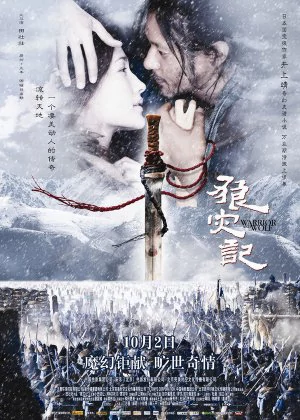The Warrior and the Wolf
When Tian makes a new film, I take notice. he is without a doubt, my favorite Chinese arthouse director, though his somewhat modest productivity makes it difficult to build a solid view of his style and strengths. The Warrior and The Wolf [Lang Zai Ji] is his latest, and even though he's seemingly pursuing a more commercial route, it won't take long to realize it's all just a façade.
![screen caps of The Warrior And The Wolf [Lang Zai Ji]](/thumbs/img/articles/1200xauto/warrior-wolf-1.webp)
Ang Lee (Crouching Tiger) and Yimou Zhang (Hero) started an ongoing trend in Chinese cinema, leading arthouse directors to direct big, epic, and action-filled period pieces. And while the world is still waiting for Hsiao-hsien Hou's The Assassin, Tian is filling the current void. Though it must be said, Tian's The Warrior and The Wolf doesn't really compare well to Zhang and Lee's efforts, but lies closer to grittier films like The Warlords or Battle Of Wits.
Those expecting another straightforward genre piece, be warned. Tian may be treading in this particular territory, but that doesn't mean he simply changed his style accordingly. There is not much action and even less heroism to be found in his film. Where films like this are usually about heroics, victory, and conquering armies, Tian's film is about loss, pain, and bewilderment. It's not epic, nor is it an easy watch, though that doesn't mean you should simply toss it aside.
The story isn't very easy to summarize. Central to the tale is Odagiri's character, who is recruited into an army during the first act of the film. From there on, we follow his transformation from a peaceful country bumpkin to the commander of the army. And beyond. The second and third acts are small story arcs by themselves, centering around the same set of characters, but highlighting a different period in their lives. Tian lets his film flow like a mountain stream, twisting through space and time. The narrative structure is highly unconventional, rather hard to follow, and disjointed, but this does not hurt the themes and sentiments of the film. For many this will be a big hurdle, I myself appreciated this free-form way of storytelling.
![screen caps of The Warrior And The Wolf [Lang Zai Ji]](/thumbs/img/articles/1200xauto/warrior-wolf-2.webp)
Visually The Warrior and The Wolf is a shimmering masterpiece. Tian's color palette is moody and menacing, littering the screen with dark shadows and desaturated blues and greens. This works wonderfully well when outside, but the indoor scenes turned out just a little too dark to my liking. The narrative was hard enough to follow as is, but peering to see what happens on screen can become a bit much at times. It's only a small issue in a few particular scenes, but it does harm the second act a little, which is mostly playing between four walls.
The soundtrack is pretty awesome, working with modernized interpretations of traditional Chinese music. Tian's use of music is as subtle as ever, especially considering the genre he's operating in. It's not as refined as in his earlier films, but it works miracles with the visuals. Acting is very strong too, with Odagiri in yet another powerful role. His international career is taking off like a rocket and he holds up pretty well in foreign cinema. Maggie Q complements him, and the chemistry between the both of them does light up the second act. The rest of the supporting cast is equally impeccable.
![screen caps of The Warrior And The Wolf [Lang Zai Ji]](/thumbs/img/articles/1200xauto/warrior-wolf-3.webp)
Short intertitles explain the gaps and holes in the main story. Flashbacks and flash-forwards tell you what you need to know, though many of the details are hidden deep within the dark shadows that leap over the screen. Multiple viewings will probably sculpt a better picture of various scenes and plot points, but the overall impression is crystal clear. Tian's vision of epic period pieces is one that is dark, gritty, and unpleasant. The mythology is fascinating, raw, and as pure as the cruel surroundings the characters reside in. The result is something that compares difficult to other films in the genre but stands proud on its own two feet.
If you're looking for an action-filled film leaving you behind in a victorious state of mind, The Warrior and The Wolf is probably not for you. If you're looking for a typical dramatic arthouse-light fare, you can just as well skip Tian's latest. But if you're up for a good 90 minutes of alternative, arthouse-inspired genre cinema, this might be just the film for you. Ignore (or embrace) the wayward storytelling and let yourself be swamped by the majestic and dark imagery, and you'll have no problem uncovering the heart of The Warrior and The Wolf. Superb cinema.
